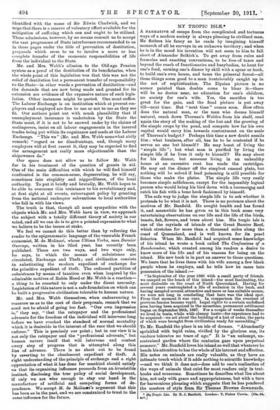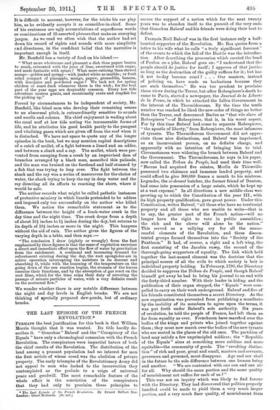MY TROPIC ISLE.* A NARRATIVE of escape from the complicated
and tortuous ways of a modern society is always pleasing to civilized man. He flatters his fancy as he reads by imagining himself monarch of all he surveys in an unknown territory ; and when he is in the mood his invention will not seem to him to fall short of Alexander Selkirk's. To get away from rules and formulas and exacting conventions, to be free of taxes and beyond the reach of functionaries and busybodies, to bunt for one's food, earning one's dinner by skill with a, spear or hook, to build one's own house, and tame the primeval forest—all these things seem good to a man irretrievably caught up in the net of sophistication. The Elysian picture is no sooner painted than doubts come to blear it—there will be no doctor near, no education for one's children, no society for one's wife. Yes, the sacrifice is too great for the gain, and the fond picture is put away till—next time. But "next time" comes soon. How often does the natural man, or the man who deems himself natural, reach down Thoreau's Walden from his shelf, read again the story of the making of the but and the growing of the simple crops by the pond, and compute how far his own capital would carry him towards contentment on the scale of Thoreau's budget.? Perhaps this time a new doubt assails him : what business, after all, has he to be contented if he serves no one but himself P He may boast of living the "simple life "; but what man is purified by living the simple life if he lives it only to himself ? He may shoot for his dinner, but someone living in an unhealthy house at an excessive rent has made the cartridges. Re may eat the dinner off the simplest enamel plate, but nothing will be solved if lead poisoning is still possible for those who make the plates. The simple life very easily becomes simple selfishness, except for the impossibly logical person who would bring his bird down with a boomerang and catch his fish with a bone hook fashioned by himself.
The safe way to judge the simple life is to ask' whether it pretends to be what it LS not. There is no .pretence about the motives of Mr. Bonfield, He sought health and has found it, and meanwhile he has given us in this book some, very entertaining observations on our life and the life of the birds, beasts, fish, flowers, and trees about him. His tropic isle is one of the myriads of islands of the Great Barrier Reef, which stretches for more than a thousand miles along the coast of Queensland, and is well known for its pearl fisheries. When Mr. Banfield bad acquired some knowledge of his island he wrote a book called The confessions of a Beachcomber, which created among his readers a desire to know more of his life and of his reasons for being on the island. His new book is in part an answer to those questions. We learn that he lives there with his wife among a few black people whom he employs, and he tells how he came into possession of the island --
"In September of the year 1896 with a small party of friends we camped on the beach of this island—the most fascinating, the most desirable on the coast of North Queensland. Having for several years contemplated a life of seclusion in the bush, and having sampled several attractive and more or less suitable scenes, we were not long in concluding that here was the ideal spot. From that moment it was ours, In comparison the sweetest of previous fancies became vapid. Legal rights to a certain undefined area having been acquired in the meantime, permanent settlement began on September 28th, 1897. For a couple of weeks thereafter we lived in tents, while with clumsy haste—for experience had to be acquired—we set about the building of a but of cedar, the parts of which were brought from civilization ready for assembling."
To Mr. Bonfield the place is an isle of dreams. "Abundantly sprinkled with tepid rains, vivified by the glorious sun, its verdure tolerates no trace of age." It is "an unkempt, un-
restrained garden where the centuries gaze upon perpetual summer." Mr. Bonfield loves his island so well that whatever he bends his attention to has the whole of his interest and affection. His notes on animals are really valuable, as they have an intimate touch which if it adds nothing to scientific knowledge —and we think it doss not—does add to one's realization of the ways of animals that exist for most readers only in text- books and museums. Sometimes he describes what lies about him, not only with grace and appropriateness, but with a turn for harmonious phrasing which suggests that he has pondered the masters of style from Sir Thomas Browne downwards.
• are Tropic Isle. By N. J. Bonfield. London : T. Fisher Unwire. [10s. 6d. net.] It is difficult to account, however, for the tricks his ear play
him, as he evidently accepts it as councillor-in-chief. Some of his sentences are ugly accumulations of superfluous words or combinations of ill-assorted phrases that make an annoying
jargon. As we read we often wish that the author had set down his record of sights and sounds with more simplicity and directness, in the confident belief that the narrative is important enough in itself.
Mr. Banfield has a variety of food on his island:-
" What more wholesome and peasant a dish than papaw beaten to mush, saturated with the juice of lime, sweetened with sugar, and made fantastic with spices ? What more enticing than stewed mango—golden and syrupy—with junket white as marble ; or fruit salad compact of pineapple, mango, papaw, granadilla, banana, with limejuice and powdered sugar ? We lack not for spring chicken or roast duck whenever there is the wish; for the best part of the year eggs are despicably common. Every low tide advertises oysters gratis, and occasionally crabs and crayfish for the picking up."
Forced by circumstances to be independent of society, Mr.
Barfield, like blind men who develop their remaining senses to an abnormal pitch, is extraordinarily sensitive to sounds and smells and colours. His chief enjoyment is wading about the coral reef at low tide noting the innumerable forms of life, and he attributes his good health partly to the pungent and vitalizing gases which are given off from the reef when it is disturbed. We have not space to quote any of the longer episodes in the book, but we may mention capital descriptions of a catch of mullet, of a fight between a lizard and an adder, and between a shark and a ray. The mullet, which were pre- vented from escaping from a creek by an improvised dam of branches arranged by a black man, assaulted this palisade, and the man was bruised on the forehead and half stunned by a fish that was trying to leap over. The fight between the shark and the ray was a series of manoeuvres for the choice of water, the shark trying to keep the ray in deep water and the ray directing all its efforts to reaching the shore, where it would be safe.
The author records what might be called pathetic instances of protective mimicry in which lizards pretended to be adders and imposed only too successfully on the author who killed them. We notice the remarkable statement as to the difference between the height of, a fresh-water creek in the day time and the night time. The creek drops from a depth of about 10i inches to 1 inches during the day, but returns to its depth of 101 inches or more in the night. This happens without the aid of rain. The author gives the figures of the varying depth in a. table, and then says :—
"The conclusion I draw (rightly or wrongly) from the fact emphasized by these figures is that the mass of vegetation exercises a direct and immediate effect upon the flow of water by gravitation from the catchment. A. continual and increasing demand for refreshment existing during the day, the root spongioles are in active operation intercepting the moisture in its descent and absorbing it, while with the lessening of the temperature on the going down of the sun reaction begins, the stomata of the leaves exercise their functions, and by the absorption of gas react on the root films, which for the time relax their duty of arresting the passage of minute particles of water, with a very definite result on the nocturnal flow."
We wonder whether there is any notable difference between the night and day levels in English brooks. We are not thinking of specially prepared dew-ponds, but of ordinary
brooks.











































 Previous page
Previous page